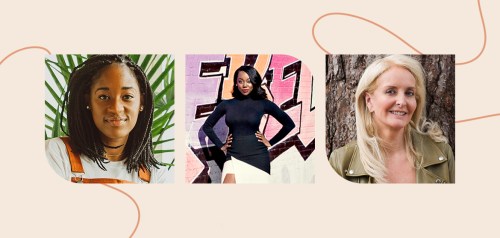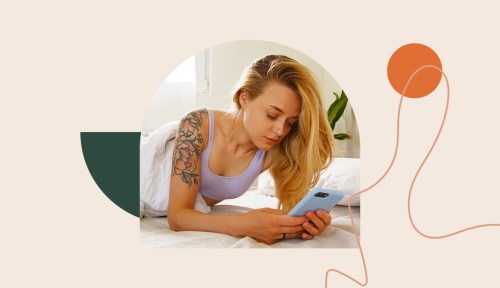To borrow a word from the tech industry, the biggest social-media platforms have grown as big as they are because they’re “sticky.” We’re stuck on these programs as users because of advanced algorithms designed to feed us images of things we want and people we aspire to be. And there’s perhaps no clearer evidence of that stickiness than what ensues when the platforms suddenly shut down (as was the case with Facebook and Instagram for several hours on October 4), and our hands still gravitate toward them, like confetti to glue. But while an overuse of social media can certainly spur mental-health issues, the effect of these platforms may be more about the ways in which we use them rather than simply how much. By being more vulnerable on social media, we can insert some real intimacy into the otherwise mindless scroll.
Experts in This Article
Bea Arthur, LMHC, is a psychotherapist, entrepreneur, and author. Her last company In Your Corner (formerly Pretty Padded Room) was a pioneer of the e-therapy movement and was one of the first to deliver mental healthcare online. Bea’s latest venture, The Difference, takes her mission even further by providing on-demand access to live therapists as Amazon’s first mental-health Alexa Skill.
founder and CEO of Somewhere Good
Tanya is a trailblazing author, pioneering thinker and campaigner on digital wellbeing and tech ethics, and founder of the digital detox movement Time to Log Off.
Figuring out how to put the social back into social-media platforms is the subject of the latest episode of The Well+Good Podcast. During the conversation about how and why social media has become mostly a stream of highlight reels, psychotherapist Bea Arthur, LMHC, founder of virtual-therapy service The Difference; author Tanya Goodin, founder of digital-wellness company Time To Log Off; and Naj Austin, founder of social platform Ethel’s Club, share intel on how we can engage with social media more holistically and authentically—and why it’s important to do so.
Listen to the full episode here:
To get one thing clear upfront, being vulnerable is not what today’s big social platforms were built to encourage. That’s because, in order to be vulnerable, you need to feel safe. And safety simply wasn’t at the heart of Twitter or Facebook’s initial roadmap, says Austin. “When you have products made for people to have discourse, and you bypass things like moderation and you bypass things like conflict that will inevitably come up when you have more than two people in conversation, you’re going to have problems,” she says.
“We lost the original awesomeness about Facebook and Instagram and Twitter, which was that you could stay in touch with people you didn’t see every day.” —psychotherapist Bea Arthur, LMHC
As these platforms prioritized things like clicks, comments, and likes, and began surfacing in our feeds pictures of strangers and ads, the tools themselves morphed into a version of what Arthur calls “connectivity without intimacy.” “We lost the original awesomeness about Facebook and Instagram and Twitter,” she says, “which was that you could stay in touch with people you didn’t see every day and expand your network and communities.”
While the obvious answer to these woes might be just to engage in a full social-media break, because the big platforms are so thoroughly ingrained in our lives, that’s not necessarily a reality for many folks, nor is it always the best option. In fact, being vulnerable on social media and showing up as our whole selves rather than just sharing our highlight reels can help us return to the less curated, more authentic conversations that early social media engendered (remember Facebook wall posts?) and infuse the current social landscape with a sense of much-needed realness.

Why only sharing the highlights limits intimacy on social media
The key elements driving our behavior on social-media platforms—likes, followings, retweets, comments, and so on—create a need to be chasing something upon reveal, says Austin. The more you’re focused on that, the less likely you’ll be to offer something authentic that’s happening in your life. Enter: the highlight reel, or our tendency to show only the high points of our lives.
“I’ll scroll back on someone’s profile to 2018, and it’s like, they haven’t missed. Everybody has nothing but hits, and you start to wonder, Are you ever sad?, Do you have emotions?, Is your life truly that perfect?” asks Austin.
That line of thinking creates a dangerous spiral, where the scroller might begin to question their own life—something Arthur calls our “culture of comparison”—and, perhaps, feel lesser as a result. And, in turn, they begin to share only the highlights of their life, too, leading to even less authenticity and connection on the platform overall.
How to be more vulnerable on social-media platforms
First, Goodin says it’s essential to resist the urge to only be upbeat or positive, as this can stop real connection in its tracks by giving others the impression that your life is always great. “I think the difficulty in being vulnerable is that it’s uncomfortable viewing, isn’t it?” she says. “It’s uncomfortable to look at somebody when they’re in pain or going through something difficult, but I do think it’s important that everyone does it, even in their own small way—in the way that feels right for them.”
That means there’s no pressure to share any more than you feel comfortable sharing, but whenever you do seek connection or conversation, it’s helpful to offer up whatever you’re actually feeling. When you do that, you’re not looking for a certain number of likes because the desire to share didn’t spring from a highlight-centric frame of mind; instead, you’re looking for a meaningful response.
“It’s not going to be a massive soul-bearing for everyone,” says Goodin. “But every so often, we need to say, ‘This is my reality.’ And the more of us that do that and the more of us that see other people doing that, the closer we are to getting social media back on track.”
Oh hi! You look like someone who loves free workouts, discounts for cutting-edge wellness brands, and exclusive Well+Good content. Sign up for Well+, our online community of wellness insiders, and unlock your rewards instantly.
Sign Up for Our Daily Newsletter
Get all the latest in wellness, trends, food, fitness, beauty, and more delivered right to your inbox.
Got it, you've been added to our email list.











